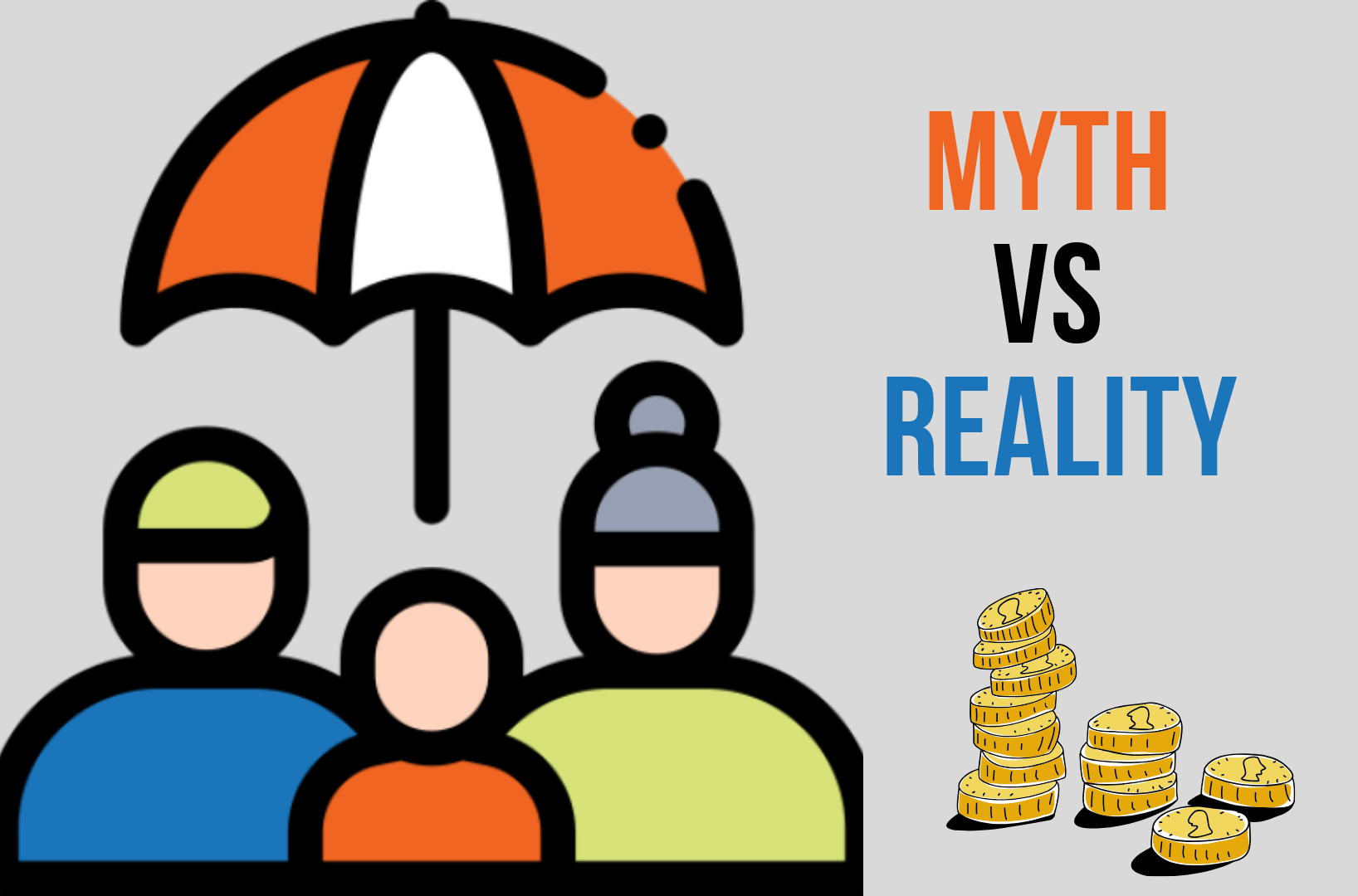
General
MYTH VS REALITY
Myth
‘EARNING MEMBER’ needs to be insured.
Reality
Financial obligations increases immediately in case of parent’s serious illness or premature death.
With a death, the surviving parent has to deal with the financial challenges of caring for their children and the home, in addition to paying any expenses and outstanding debts.
They may even have to work reduced hours or take additional time off to care for the family. Life insurance can ease some of the financial burden, allowing the family to focus on emotional healing.
Myth
Health insurance will cover my critical illness.
Reality
Source: Zurich Life claim statistics
Health insurance might cover some or all of the treatment, but it doesn’t cover the impact of the loss of earnings, or financial commitments like children’s education, and loan or mortgage payments.
While it’s great news that survival rates for many critical illnesses are improving, it also means many people are living with the effects of having suffered a life threatening disease.
This can mean a complete change in lifestyle, so it’s vital to protect yourself and your loved ones from the financial implications of a serious illness.
You never know when the unthinkable might happen, whether that’s becoming critically ill, disabled or dying prematurely.
Dr Marius Bernard once said;
"Medical science can save lives, but it can’t salvage lost bank balances In other words, we will keep you alive, but we won’t provide the money to support you." When you are critically ill or disabled, would you prefer cash or sympathy? A year of illness can wipe away savings of 10 years.
- • Each year nearly 20 million people survive heart attacks and strokes; many require continuing, and costly, medical care.
- Source: World Health Organization – www.who.int, March 2010.
- • 10 million people survive strokes each year. Of these stroke victims 40% experience moderate to severe impairments requiring special care.
- Source: WHO, www.who.int and The University Hospital – www.universityhospital.com, March 2010.
- • Every year more than 12 million people are diagnosed with cancer, that’s about 33,000 each day.
Source: American Cancer Society – www.cancer.org, March 2010.
Critical illness covered under critical illness insurance plans are:
1. Aorta graft surgery – for disease and trauma- 2. Aplastic anemia – resulting in permanent symptoms
- 3. Bacterial meningitis – resulting in permanent symptoms
- 4. Benign brain tumor – resulting in permanent symptoms
- 5. Blindness – permanent and irreversible
- 6. Cancer – excluding less advanced cases
- 7. Cardiomyopathy
- 8. Coma – with permanent symptoms
- 9. Coronary artery bypass grafts – with surgery to divide the breastbone
- 10. Creutzfeldt-Jakob disease – requiring continuous assistance
- 11. Deafness – permanent and irreversible
- 12. Dementia (including Alzheimer’s disease) before age 65 – resulting in permanent symptoms
- 13. Ductal carcinoma in situ of the breast – with specific treatment (partial payment)
- 14. Encephalitis
- 15. Liver failure – end stage
- 16. Lung disease – end stage/respiratory failure – of specified severity
- 17. Heart attack – of specified severity
- 18. Heart failure
- 19. Heart valve replacement or repair – with surgery to divide the breastbone
- 20. HIV infection – caught in a specified country from a blood transfusion, a physical assault or work in an eligible occupation
- 21. Kidney failure – requiring dialysis
- 22. Loss of independent existence – resulting in permanent symptoms
- 23. Loss of hands or feet – permanent physical severance
- 24. Loss of speech – total, permanent and irreversible
- 25. Major organ transplant
- 26. Motor neuron disease
- 27. Multiple sclerosis – with persisting symptoms
- 28. Open heart surgery – with surgery to divide the breastbone
- 29. Paralysis of limbs – total, permanent and irreversible
- 30. Parkinson’s disease before age 65 – resulting in permanent symptoms
- 31. Primary pulmonary arterial hypertension – resulting in permanent symptoms
- 32. Stroke – with permanent symptoms 33. Systemic lupus erythematosus – of specified severity
- 33. Third-degree burns – covering 20% of the body’s surface area or 50% of the face’s surface area
- 34. Traumatic head injury – with permanent symptoms
- 35. Children’s critical illness
That’s where life insurance can make the world of difference, by supporting you and your loved ones financially.
As a parent, you take on many roles for your children – teacher, chef, doctor, and chauffeur. It’s certainly a full-time job, and no one can take your place. You often put your children’s needs before your own.
From their first day at school, to their graduation day and beyond, you want to protect your children and give them the best opportunities in life.
But to truly protect them and see them fulfil their dreams, you first need to safeguard your own future.
What would you do if the worst were to happen?
While you wouldn’t knowingly put your family’s lifestyle in jeopardy, many parents unintentionally leave their family exposed, believing that they have other ‘safety nets’ in place.
By having life insurance, you can avoid having to withdraw your life savings, sell your assets, or surrender your investments, which could leave you financially vulnerable.
Ask yourself these simple questions;
- 1. Do you have dependents?
- 2. Would your dependents be affected if they could no longer rely on your income?
- 3. Would your financial position be affected if you or your partner were to suffer from a serious illness or die prematurely?
- 4. Do you have a mortgage, personal loans or credit card debt.
- 5. Are you currently saving for education, retirement, or some other goal?
- 6. Do you intend to leave and/or children inheritance for your spouse?
If the answer to the above questions is “Yes†then it’s time for you to hire or consult a PERSONAL FINANCIAL PLANNER soon.
For Further Insights;
Contact:
Ravi Cheerath
Email: [email protected]
WhatsApp: 0544546910